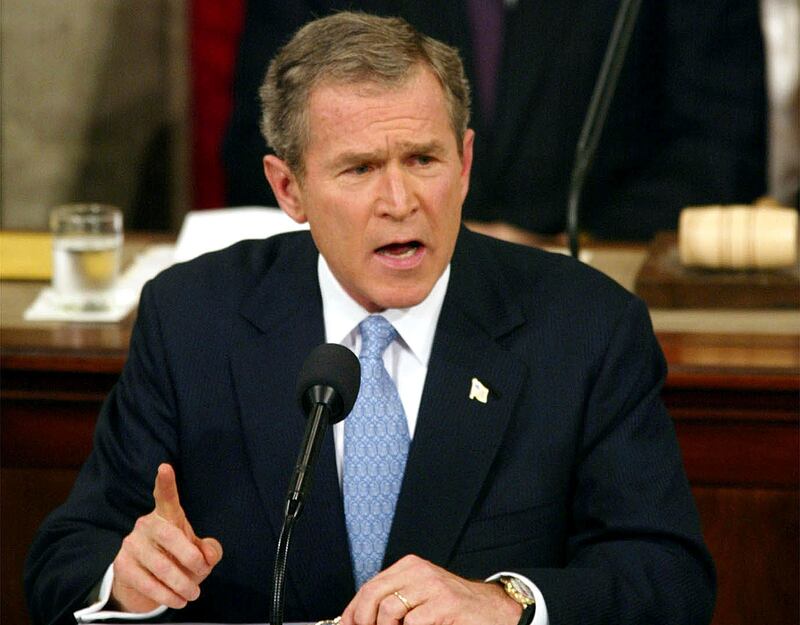Former US presidents George HW Bush and George W Bush lent their voices to the chorus of leading Republicans condemning racism on Wednesday, in a veiled rebuke of Donald Trump.
The current US president sparked a political firestorm on Tuesday when he said counter-protesters appeared to be equally to blame for violence over the weekend at a white nationalist rally in the Virginia city of Charlottesville.
In a joint statement, the father and son former presidents said, "America must always reject racial bigotry, anti-Semitism, and hatred in all forms".
They made reference to Thomas Jefferson, the author of the Declaration of Independence whose main home, Monticello, is in Charlottesville.
"As we pray for Charlottesville, we are reminded of the fundamental truths recorded by that city's most prominent citizen in the Declaration of Independence: we are all created equal and endowed by our Creator with unalienable rights," they said.
"We know these truths to be everlasting because we have seen the decency and greatness of our country."
The joint statement did not mention Mr Trump by name.
-----------------------------------------
Read more:
[ Trump finds favour with far-right after praising 'fine people' on neo-Nazi march ]
[ Assad finds fan base among white supremacists in Charlottesville ]
[ Trump condemns white supremacists — two days after neo-Nazi kills protester ]
-----------------------------------------
Heather Heyer, 32, was killed and 19 other people injured in Charlottesville on Saturday when a suspected white supremacist drove his car into a group of counter-protesters.
Heyer was being remembered on Wednesday at a memorial service in Charlottesville.
At a heated press conference in New York on Tuesday, Mr Trump appeared to put the white nationalists and counter-demonstrators on equal moral ground.
"I think there is blame on both sides," said the Republican president. "You had a group on one side that was bad, and you had a group on the other side that was also very violent."
There were "very fine people" on both sides, he added.
His remarks have drawn widespread criticism including from within his own party.
The Senate majority leader, Mitch McConnell, on Wednesday issued a statement that was similar to that of the former Bush presidents.
Without mentioning Mr Trump by name, Mr McConnell said "messages of hate and bigotry" from white supremacists, the Ku Klux Klan and neo-Nazi groups should not be welcome anywhere in the United States.
"We can have no tolerance for an ideology of racial hatred. There are no good neo-Nazis, and those who espouse their views are not supporters of American ideals and freedoms. We all have a responsibility to stand against hate and violence, wherever it raises its evil head," he added.
Mr Trump last week lambasted Mr McConnell for the Senate's failure to pass health care legislation backed by the president, and did not dismiss the idea of the majority leader stepping down.
Ohio governor John Kasich, meanwhile, said there was no moral equivalency between the Ku Klux Klan, neo-Nazis and anybody else.
"This is terrible. The president of the United States needs to condemn these kind of hate groups," Mr Kasich said on NBC's "Today" show. Failure to do so gave such organisations a sense of victory and license to hold more events elsewhere, he added.
Mr Kaisch was one of Mr Trump's rivals for the Republican nomination in the 2016 presidential election.
Republican Senator Lindsey Graham, long a critic of the president, took more direct aim, saying in a statement aimed at the president, "Your words are dividing Americans, not healing them".
Other leading Republicans to criticise Mr Trump's remarks included former Massachusetts governor and 2012 Republican presidential candidate Mitt Romney and US senator Marco Rubio, also a Trump rival in the 2016 campaign.
Ronna Romney McDaniel, head of the Republican National Committee, went some way in defending Mr Trump on Wednesday, however, saying he had simply acknowledged there had been violent individuals on both sides of the clashes in Charlottesville. But she assigned the blame to the white nationalists who mounted the rally, saying, "We have no place in our party for KKK, anti-Semitism … racism, bigotry".
Leaders of the four major US military services have also spoken out against racism and extremism in the wake of the Charlottesville violence — though all have made no mention of Mr Trump in their comments.
Military officers in the US are trained to avoid politics though they traditionally see it as their duty to emphasise to troops core values such as racial equality and tolerance. The 20-year-old Ohio man accused of killing Heyer on Saturday had enlisted in the US army and began basic training in 2015. He was released from active duty four months later, however, for what the army described only as "a failure to meet training standards".
The navy's top officer, Admiral John Richardson, was the first of the military chiefs to respond to Saturday's violence in Charlottesville. That evening he took to Twitter to say the events there were "unacceptable and mustn't be tolerated".
His spokesman said on Wednesday his comments were "motivated solely by the shameful and unacceptable events that occurred in Charlottesville — period".
Other service chiefs followed Adm Richardson but did not explicitly mention Charlottesville.
Amid the fraying ties with his party, Mr Trump has planned a rally for next Tuesday in Arizona, the home state of two Republican US senators, John McCain and Jeff Flake, who have been particularly critical of him.
Also on Wednesday, Hope Hicks, a close aide to Mr Trump, was named interim White House director of communications, temporarily taking the post left vacant after Anthony Scaramucci was fired last month, a senior White House official said.






